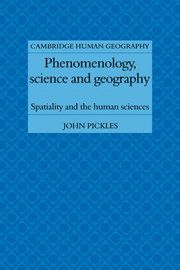Book contents
- Frontmatter
- Contents
- Preface
- Acknowledgements
- 1 Introduction
- PART I GEOGRAPHY AND TRADITIONAL META-PHYSICS
- PART II GEOGRAPHY AND PHENOMENOLOGY
- 3 The interpretation of phenomenology in geography
- 4 Geographical phenomenology: a critique of its foundations
- PART III PHENOMENOLOGY AND THE QUESTION OF HUMAN SCIENCE
- PART IV HUMAN SCIENCE, WORLDHOOD AND SPATIALITY
- Notes
- References
- Index
3 - The interpretation of phenomenology in geography
Published online by Cambridge University Press: 07 September 2010
- Frontmatter
- Contents
- Preface
- Acknowledgements
- 1 Introduction
- PART I GEOGRAPHY AND TRADITIONAL META-PHYSICS
- PART II GEOGRAPHY AND PHENOMENOLOGY
- 3 The interpretation of phenomenology in geography
- 4 Geographical phenomenology: a critique of its foundations
- PART III PHENOMENOLOGY AND THE QUESTION OF HUMAN SCIENCE
- PART IV HUMAN SCIENCE, WORLDHOOD AND SPATIALITY
- Notes
- References
- Index
Summary
If science is not to degenerate into a medley of ad hoc hypotheses, it must become philosophical and must enter upon a thorough criticism of its own foundations.
(Whitehead, 1925, 24–5)The phenomenological basis of geography
As to whether or not geography should be considered a science, and if so, what sort of science it would be, geographical inquiry has always been rather tentative, and its claims generally ambiguous. Particularly in the United States, geography's historical roots in the physical ontology of Davisian physiography, and later in the biological ontology of Barrows' spatial ecology, suggest a one-sided foundation in the physical and biological sciences. The recognition of a much older European tradition in the influential works of Sauer and Hartshorne was important for a discipline seeking to unify its developing and yet disparate realms of inquiry and discourse. Geographers variously trained as geologists, botanists, cartographers, and increasingly as economists, sought to come to some understanding of the common ground they occupied (see James and Martin, 1978). The subsequent methodological debates left many disenchanted with the possibility of providing any such unifying basis to their own activities.
Spatial analytics similarly sought to redefine the discipline as a spatial science within which various systematic issues could be addressed and through which the common interests of several fields could be expressed.
- Type
- Chapter
- Information
- Phenomenology, Science and GeographySpatiality and the Human Sciences, pp. 41 - 67Publisher: Cambridge University PressPrint publication year: 1985



